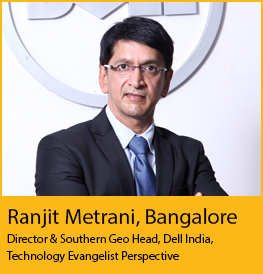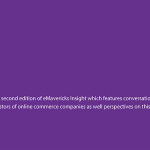Key takeaways from the ‘eMavericks Expert Talk’ on ‘Customer Centric Digital Business Transformation’. It was conducted as a Google hangout on 16 July, 2015. The link to this online event including the video for the full session is here. You can also see it on Youtube here.

How are the customer expectations changing in the Services and Retail industry in recent times?
In today’s time, Retail is getting really complicated. It is no more about keeping stuff on the shelf and waiting for the consumer to come visit. The retailer needs to make goods available on websites, apps, msites, etc. Customers want a seamless experience between brick & mortar and e-commerce (be it web or mobile). We need to make it easier for customers to get in touch with the brand and integrate the services via an Omni-channel.
What were the key challenges in taking Pizza Hut online in India and how did you overcome them. Share the main highlights from your journey.
We have 400 stores in India and operate as a franchise business. This multi-franchise model translated into multiple technology platforms, i.e., different point of sale systems for each franchise partner. Hence, the biggest challenge was how to integrate all. Secondly, while working across India there is always a challenge on getting persistent connectivity in category B,C, and D cities. We have to ensure that order gets dispatched on time and reaches on time. The pizza business is based on a 30 minutes delivery guarantee; this gives just a couple of seconds for tech communication. Lastly, for each store there is a defined trade area. We had to ensure that for consumers ordering online – the order gets placed and fulfilled from the respective trade area store only. Our competition was way ahead. They had started much earlier. We were late entrants and had to cover a lot of ground.

Online commerce is extremely hot right now in China and India. What are you hearing from your customers across the Asia Pacific and Japan Region?
There are new trends and buzzwords in the industry today: Cloud, Big Data, Mobility, and Web Scale. The force behind these is the Digital Transformation of Business Process and Business Models. The e-commerce market is right at the epicenter of Digitisation of Business Processes. Markets are becoming competitive and geographies are becoming irrelevant. Businesses need to be agile. Large global players can enter any markets; ‘well-positioned’ small Asian companies can look outside their host countries for growth via innovation and agility. Online commerce giants are setting the trend with IT adoption and are raising the technology bar for smaller e-commerce companies.
Technology has to become the competitive advantage: key value proposition and go-to market.
Concept of time to market: How quickly can you introduce a new feature; how quickly can you add a new capability to your platform? How responsive are you to customer behavior change?
There is a strong need for the business to not only understand their market and their customer, but also equally their own capability and positioning. There is a need for real-time rapid analytics. You spoke about Big Data; do you see the need of Data scientists sitting inside a marketing organization in the future to generate market intelligence?
That’s a great question. Data scientist as a role is very niche. A natural progression of IT is to take on the complex and make it simple. I don’t see Data Scientist being required in the Marketing Department but I do see the need of sophisticated analytical tools required by Marketing. A natural evolution of the role of a Marketing professional will be to become good with data mining and analytics.

How Explara continues to be a customer centric company; taking a platform approach and creating compelling value for both Event Organisers and Event Participants?
Essentially we have put in years of focus primarily on Customer Support. We have been building the platform from scratch, ground up since 2009. At that time, India had no platform to manage the events. The organisers were using paper, excel, and email to invite guests and collect payments from them. We are the first DIY Event Platform in India. The events industry is growing. Startups can have a global play if they are able to identify the customer pain point and keep iterating on their solution. Explara is built as a platform, focusing on both sides and helping event organizers monetize. Event organisers can either make money by sponsorship or by ticketing. We lay a lot of emphasis on ticketing and engaging with the attendees early on. Explara was used for 10000 events last year; 35000 events this year Across the globe.
What innovations do you expect in the events personalization space in the near future?
From the year 2000 to 2006, lots of folks used Upcoming (which was later on acquired by Yahoo); then came the era of event listing companies but the user engagement was really not there. Today is the era of Personalisation. The platform/service needs to be very specific to a user so that he/she gets (almost) no noise. We are currently focusing on event day activities such as collecting feedback online. We are trying to go green and save paper all throughout the event management workflow.

Data is integral to all businesses. How can you extract the maximum value from your customer data?
Everyone wants to serve the Customer. Data is all about the Customer. We should be aware of where the Data resides to take real advantage of it. Today, Data is in Apps, Data in Chatter (social media), Data at Rest (enterprise systems), and Data in Motion (email, phone). Driving value from Data is a long journey. Different companies are using data differently; some only for Reporting, some for Diagnostics. Online companies are most matured in using data for their businesses. The two prime reasons why e-commerce is doing so well in India – one is technology adoption and second is they are innovating, and customer data is the key. Businesses have to be clear on what challenge they are resolving while using data.
Dell has itself been a pioneer in the e-commerce space, even before it was known as e-commerce. How have you been leveraging data within Dell for competitive advantage?
Dell started using Data in the form of phone directories, direct mailers, phone orders, and supply chain data for JIT inventory even before the Internet. Dell was the first company in the world to start selling ‘build to order’. We then migrated the offline customers online
for them to make a better choice. We tracked customer behavior on Social Media and Dell.com. We launched IdeaStorm – inputs from all our customers on how they find Dell products and Solutions. We started using Analytics to enhance Customer Experience using Net Promoter Score (NPS), improved our Supply Chain, and used Marketing Data effectively. Dell has the best Supply Chain in the world. Dell effectively used data and integrated it with our other system that is important. Today, Dell is one of the biggest users on Analytics globally. We love to track how customers respond to any Dell product launch.





No Comments